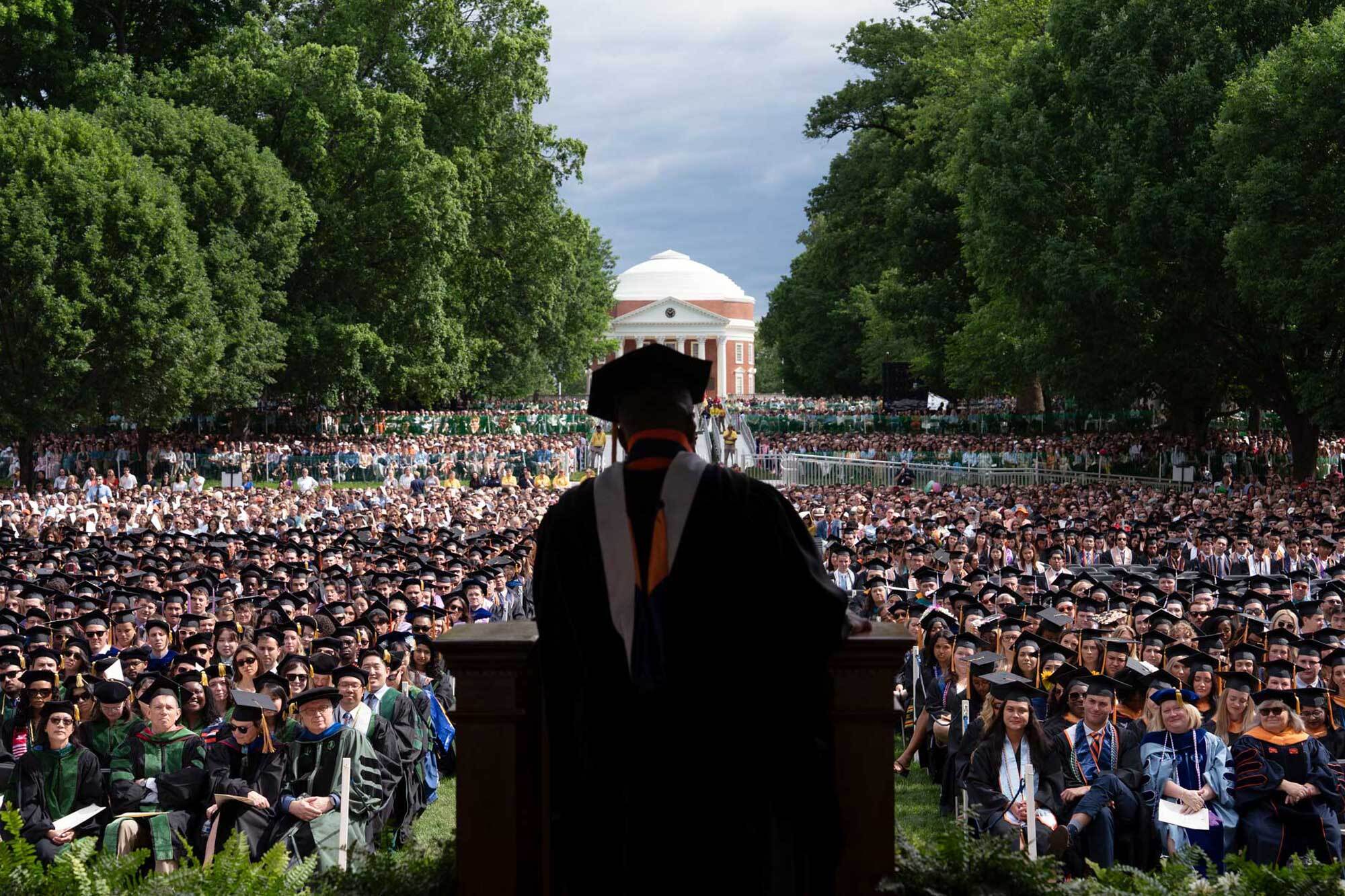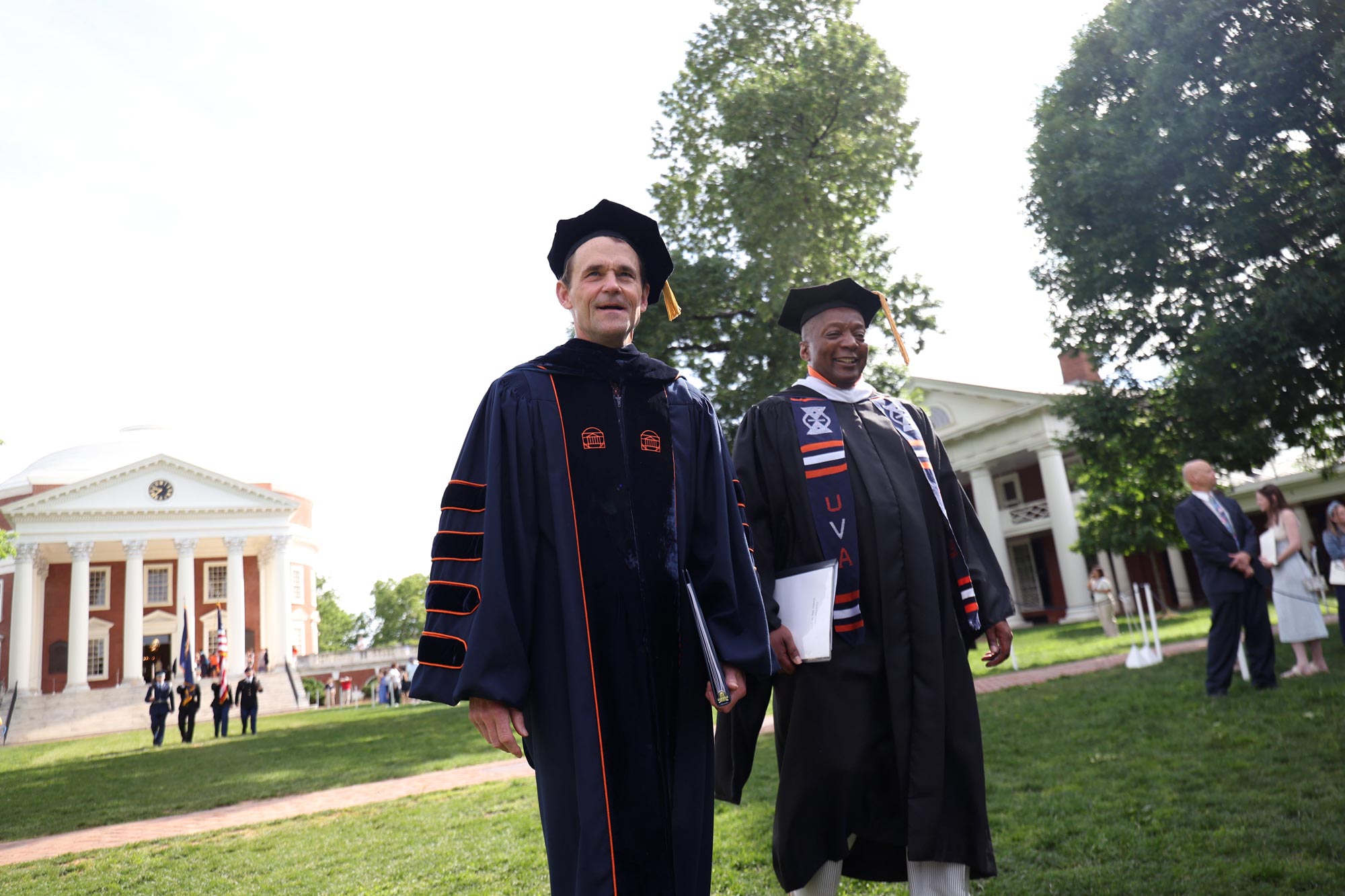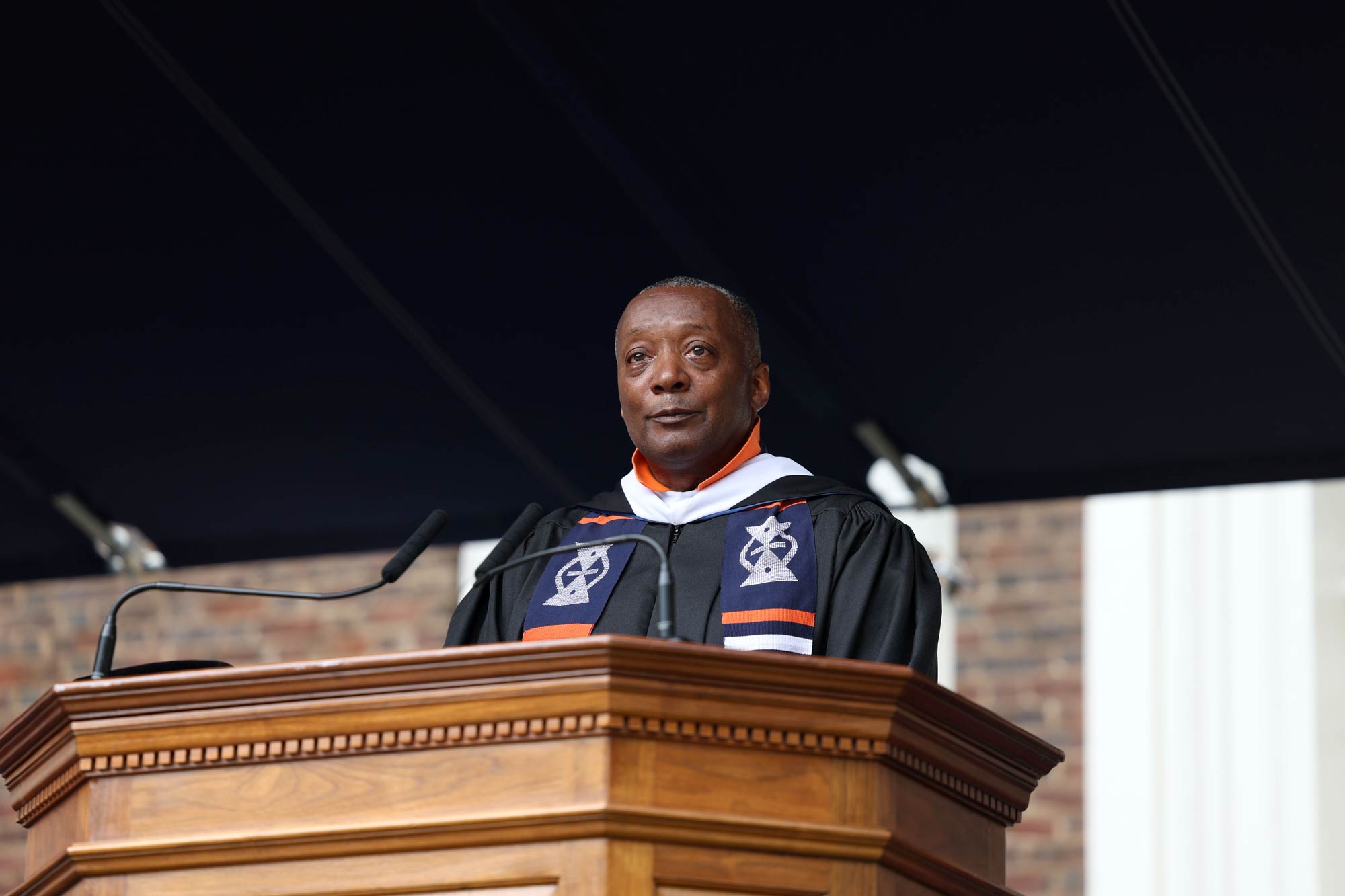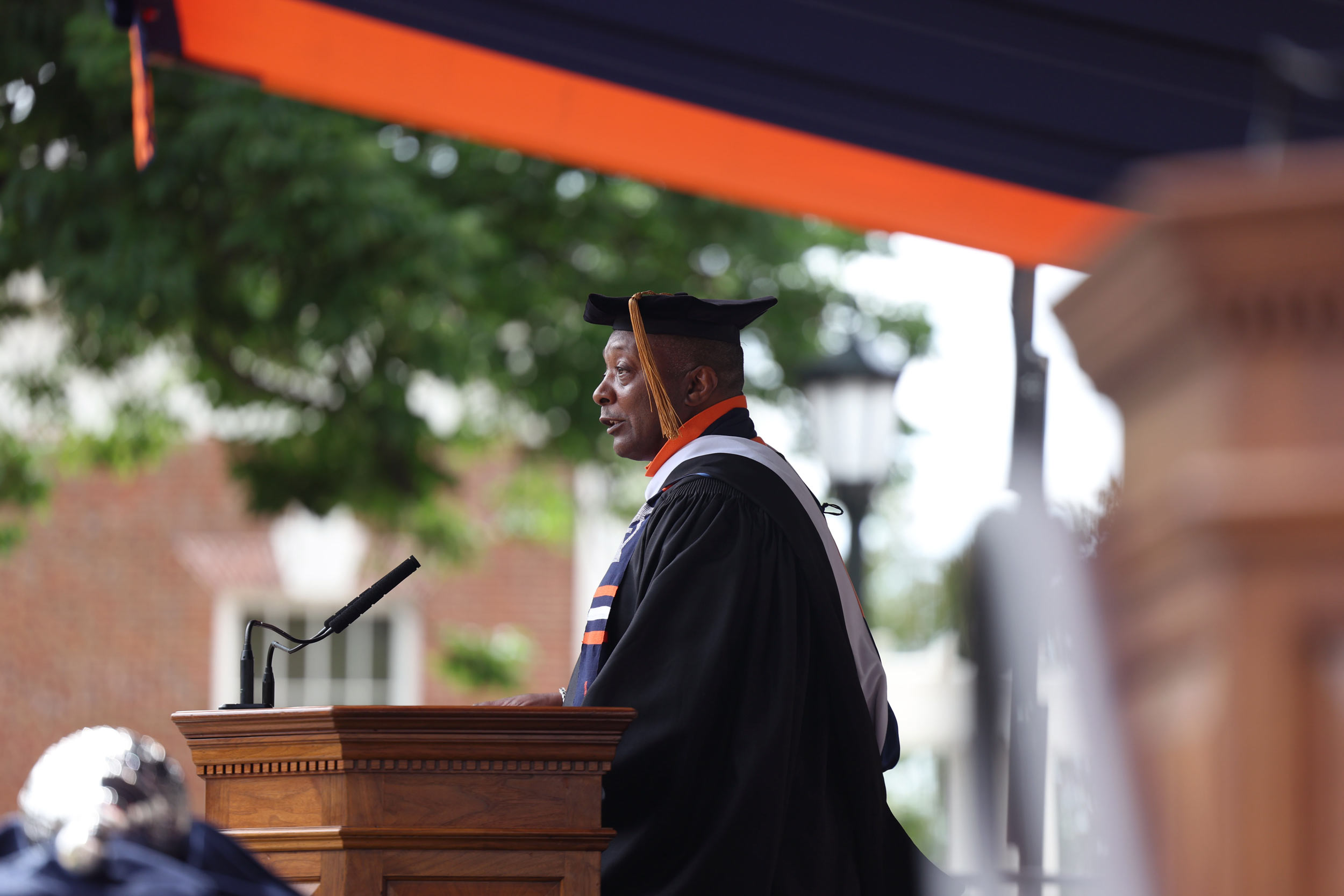Remarks prepared by Cedric Rucker, a 1984 graduate of the University of Virginia, currently serving as special advisor to the vice president and chief student affairs officer, to deliver to the University of Virginia Class of 2025 on May 18 on the Lawn.
UVA Leader to Class of 2025: Let Hope, Not Fear, Guide You Forward
Good morning.
I am not supposed to be here. I want you to know, this is not imposter syndrome. I find myself standing before you having no idea how this happened. Honestly, there was no plan, no script, no outline that would approach what would ultimately be revealed.
I am just a guy from Richmond, Virginia, an inner-city kid who grew up in the projects. One who was not supposed to rise to anything much, simply at best to be a cog in the system. Like many around me, most promisingly end up working in one of the city’s renowned factories or tobacco warehouses. Wearing the banner of “commencement speaker” was certainly not in the cards for me.
Yet, here I am. This guy who sprang from the bosom of a segregated south, with limited prospects for escape from a system of frigid restraint, locking down mobility based on a “one drop” reality surging through the social structure of everyday life. It must be said that even though these constraints were supposed be loosened with the Brown v. Board decision of 1954, my state and region of the country held on tightly to a structure as unequal, unfair, and in many instances cruelly caste-like for many more years.
I know that there are many who think that this timeframe existed beyond our contemporary consciousness, but I am very much one who journeyed through that period. This “Eisenhower baby” experienced the structural impediments that drew lines not to be crossed, doors not to be entered, fences and ropes that separated, and parts of town where one was not to be found after certain times of day. Not just a part of the far-flung history of our nation, but my living reality, in many aspects lasting through my teenage years.
There was an assortment of other complications beyond the walls of segregation, anchored in the rights of states to determine which residents would actually enjoy the full weight and measure of citizenship. I was born a sickly kid, something discovered on the day of my birth, once I was redirected to the right hospital after being born in an ambulance that was initially sent to the “white hospital” by mistake.
Officiants labeled me a “dirty” baby, because of that destination error. I was diagnosed with a heart valve disorder, one that would lead me to have three surgeries before the age of 12. Complicating matters even further, I had asthma, the cruelest of challenges for a child wanting to be active like so many others. I still remember trips to the emergency room because I could not breathe, could not catch my breath, wheezing for air – such a complicated existence as one sought to navigate youth.
With all of this, there was a ray of light. Books, literature, family and educators invested, trying to make such an uncomfortable journey meaningful. Since I was restricted in many ways from active engagement, I fell in love with reading, learning more about the world around me, and more importantly beyond my scope.
I admire the tenacity of my relatives, ever investing in the possibility of a world that they themselves hoped for, but ever seemed beyond reality. My grandmother treasured me; she gave me confidence at every turn. I was not the family favorite in my immediate household; that was my baby brother. Yet Grandma saw something that others missed. She had a vision for me, a wish, a dream that I would somehow rise, overcome any of the impediments or obstacles currently existing in the world of our origin. She let me know that I was special, and that somehow, my future would put me in places that only existed for people who lived in areas and looked different from us.
Happily, my library card was my friend. Books and teachers carried me away to distant lands, introduced me to different people, environments and places free of physical constraint and the vestiges of our racially and socioeconomically divided world. Even though I did not attend my first desegregated school until the advent of busing, I was constantly being transported across the globe to places promising to unlock restrictions. My passion for exploration was born here, with an understanding that the playing field was not universally scripted.
I discovered that there were people in the world who could bolster one’s hopes. Beyond my grandmother and teachers, I began to encounter others who would be cheerleaders and champions along the way. With enhanced technologies and research, medical professionals altered approaches to care. I was suddenly free to explore the world less restricted than before.

Rucker delivers Sunday’s keynote address to nearly 4,000 graduates from nine UVA schools including the School of Architecture, the McIntire School of Commerce, the School of Continuing and Professional Studies, the Darden School of Business, the School of Data Science, the School of Engineering and Applied Science, the School of Law, the School of Medicine and the School of Nursing. (Photo by Lathan Goumas, University Communications)
This kid of the indoors was suddenly free to explore trees, parks, museums, hikes, sports and friends. It was a delayed start, but eagerly embraced. Fortunately, I “grew out of” my asthma, breathing in fragrant air unrestrained in the midst of my new freedom. It was glorious. I made friends, opening my insular world. Buddies, pals, playmates of different backgrounds and classes. We would hang out, ride bikes across the city, discovering the variation of landscapes and neighborhoods bordering the River James. It was so cool experiencing such a changing world. I truly began to feel the freedom that was conveyed amid the broader changes taking place as social movements took hold from the ’60s to the ’70s.
High school teachers helped to plant the seeds for possibilities. Of special note was my Russian teacher, Sarah Davydovna. As a frustrated language student, I recall rejecting all that she aspired for her students, stuck in the reality of our perceived worldly limitations. She challenged us to think of what could be, that we could escape the confines of Richmond. Finding myself standing in Moscow’s Red Square for the first time almost a decade later brought me tears of gratitude for her desire to push us to dream in ways that we could hardly understand at the time.
My college years added so much more to opening my mind and world to the prospects of difference. Two professors of note for me were Bruce London and Margaret Huber (Williamson), a sociologist and an anthropologist. Bruce helped reveal the complexities of society, the social forces that act to shape the conditions that we navigate as members of social groups. Margaret facilitated my understanding of culture, the factors encompassing the norms, beliefs, behaviors and practices that influence communities and people.
From this foundation, there began to be clarity in the world that I was a part of, understanding why the experiences across race, class and gender were so different from one society or community to the next. Going to college, I thought that my destination would be law school, and I acknowledge the fortitude of the law school grads gathered here. Ultimately, and thankfully, the world of liberal arts opened my mind to a different path.
After undergraduate years at Mary Washington, I journeyed to UVA. This place, founded by Jefferson “to advance human knowledge, educate leaders and cultivate an informed citizenry.” A lark, no. A continuation of pursuing my grandmother’s dream. She was aware of this place, although she did not live long enough to see me enroll. For her, UVA was a place of privilege, for rich white kids; for her grandson to arrive on these Grounds would have been almost unimaginable, although desired. As one of those places where it would have been dangerous to even be present during her time, it would offer to her grandson a path to further discovery and growth.
Years after Walter Ridley had opened the doors for African Americans, I was here, a graduate student roaming the Academical Village and wandering the halls of New Cabell. I immersed myself in this place, learning the traditions, the songs, dressing for ballgames (we wore jackets and ties no matter the weather), living in the dorms, old and new, and Monroe Hill. Finding faculty mentors – Steve Nock, Paul Kingston of the sociology department, and one of the most significant individuals who set me on the path to a career in higher education, English professor William “Bill” Elwood. I am here today because of Bill.

UVA President Jim Ryan and Rucker make their way to the stage for the third of three days of celebrations for the Class of 2025. (Photo by Matt Riley, University Communications)
Bill Elwood was a maverick, a force of nature. He so believed in the ability of UVA to serve a greater good, especially in his commitment to making sure that those who had been previously excluded were made welcome. He was the associate dean of the Graduate School of Arts & Sciences when we met. I so remember rooms filled with students of color gathering to register concerns about their experiences at UVA at the time, with Bill being the only white face in the room. His heart and head worked in tandem. He actively worked to enhance access to graduate programs, by reaching out to and visiting undergraduate schools across the country to spread the virtues of UVA. His own research culminated in the documentary, “The Road to Brown,” documenting the work of Charles Hamilton Houston, the dean of the Howard University Law School and NAACP chief counsel, to build an army of civil rights attorneys, including future Justice Thurgood Marshall and jurist Oliver Hill.
It was Elwood who redirected my path, steering me into a career in higher education. I had no idea at the time that his words to me over 40 years ago would ring so true in time. For you see, Bill often referred to me as “Mr. UVA,” often taking me out on the road with him to engage prospective graduate students at universities across the region. He would say that “you love this place more than any other student I know, even with all its complexities. You truly believe in UVA’s potential to transform and advance, to make the world better. I must find a way to get you to stay, somehow continue to serve this place.”
Bill helped me to land a position in the Office of Undergraduate Admission, continuing the work of broadening the representation and sense of belonging for students of all backgrounds, histories and traditions. I had found my place and my cause, ultimately moving from admissions to student affairs, from engagements both inside and outside of the classroom to press forward inclusion and diversity. Empowering students to grow and advance in partnership with both the familiar and unfamiliar, among those with commonalities and great differences, in an environment where uncertainties could be explored without condemnation, resulting in an ongoing thirst to learn and live in partnership with others both alike and different.
I guess that is why I am here today. The path that I have taken, as stated at the beginning, was not planned, even uncertain. Thankfully because of those who have surrounded and championed me during this journey, I now stand in a space that I and members of my family would not have been permitted to occupy. Thankfully for the work of those individuals who touched my life directly, and the generations of social justice champions who were steadfast in their efforts to bring us forward, UVA has come far.

Rucker urges the members of the Class of 2025 “to help us as a nation and world to make sure that everyone matters, belongs, and is worthy of respect and dignity.” (Photo by Matt Riley, University Communications)
Let us not go backward. Let us ever advance the benefits of such a magnificent array of students and scholars from across disciplines and professions to call this place home. We owe this to ourselves and to our world.
Yes, it is clear, that conditions today seem to harken back to periods not brimming with the virtues or merits of inclusive environments. We cannot let this tide of retrenchment turn back the clock on who we are as a community or University. The preamble of our cherished Constitution starts with words “We the people.” These three words are among the most inclusive ever written. As members of my queer community have sloganized, these words mean “all of the people.”
Let us not reject diversity. We are better, more powerful, as an inclusive nation. It is up to you to help us as a nation and world to make sure that everyone matters, belongs, and is worthy of respect and dignity.
I know some of you are thinking, “OK, Boomer, you are the ones who mucked this up.” Yes, some of us have. Yet, having lived among you in this amazing place, strolled these Grounds in your company, shared some of the most compelling conversations with you in classrooms and meetings, debated with you on the this very Lawn, I know that you are in the best position to right the ship.
You have lived though some of the most unsettling times, and yet continued to endure and aspire. Your challenge: use the tools that you have garnered during your time here, across the multitude of schools, programs and professions, your expertise, creativity and passion. Do not forget the sense of community and the diversity of this place as you engage the world beyond these Grounds. Remember the people who have made a difference, who helped you see things from perspectives that were new to you. How you have bridged connections that you now cherish. You possess something that my generation seems to have lost: HOPE, not fear. For some reason, fear has reared its ugly head in the current sphere.
We should not fear or hold in disdain those who are different. As a first-gen, gay, Black man in America, I have benefitted mightily from the richness of the mosaic of peoples I have had the opportunity to engage. Some think that we can allay fear by turning back the clock, pushing aside decades of change. It will not. We cannot not stop time, even as we seek to forestall the future.
I have witnessed how hope lives amongst you. I think of how you came together as a community after the deaths of Lavel, D’Sean and Devin. You did not give up on your dreams in the midst of COVID. I witnessed the majesty of community, seeing how diverse souls spontaneously gathered from every quarter on the Lawn last spring, to gaze in unison at a partially eclipsed moon.
Looking out at you now, witnessing your procession down the Lawn, collectively gathering in this space so representative of the bounty of the diversity of our scholarly community, so reflective of the richness that the aspiration of inclusion adds to our world. What a phenomenal sight! I hope that UVA has evidenced a sense of belonging for you and those around you. Never forget how you have benefited from the myriads of diverse connections that you have established here. Continue to manifest that as you now step beyond Jefferson’s Academical Village, making those in the communities that you will be a part of belong in kind.
As my grandmother had unyielding faith dreaming of a world that she could not see. She would intone, “Do you want to be bitter, or do you want to be better?” Let hope ever move you to act on behalf of a more inclusive world, ever more welcoming. Never retreat!
Godspeed and Wahoowa!
Media Contacts
Senior Associate Vice President for Student Affairs and Dean of Students









